 |
     |
 |
 |
 |
|
In keeping with the Lasallian philosophy of CBC that a quality, Catholic education should be available to all students, the Mathematics Department attempts to provide a comprehensive program which serves the needs, abilities, and interests of each of our students. We seek to exhibit and develop in our students positive attitudes toward mathematics. We seek to prepare our students to use mathematics successfully in their future vocations, avocations, and leisure time. We aim, therefore, to develop the potential of each student to be a confident, self-reliant, and intellectually mature individual by providing every assurance that he acquire these basic skills necessary to function effectively.
Course Sequence Diagram
Course Sequence Diagram for Class of 2029
Course Sequence Diagram for Class of 2030
|
|
|
| |
|
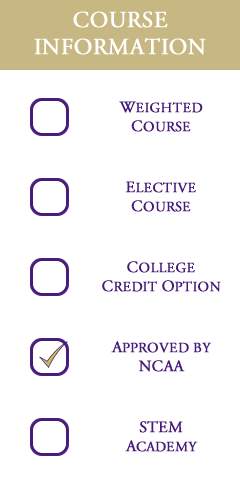 |
| College Prep |
2 Semesters |
1.0 Credit |
| Prerequisites: Open to Freshmen |
|
Course Description: This course is designed to develop students' critical thinking skills through practice, practical application, and authentic problem-solving. It provides the foundation for future mathematics courses and is required for graduation. The course includes the topics of linear and exponential equations and functions, exploring their algebraic and graphical properties and their real world application (e.g. growth models). Students will use linear regression to analyze data, fit models, and interpret statistical results. Additionally, the course includes geometric concepts, including simple proofs, relationships with lines and angles, and triangle congruence.
Upon completion of the placement test, incoming freshmen may be placed directly into Honors Integrated Mathematics 2. This exempts the student from needing Integrated Mathematics 1 for graduation. However, three credits of mathematics are still required. |
|
 |
|
|
| |
| HONORS INTEGRATED MATHEMATICS 1 |
|
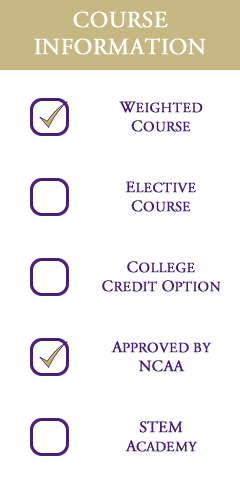 |
| College Prep |
2 Semesters |
1.0 Credit |
| Prerequisites: Open to Freshmen; Department approval |
|
| Course Description: This honors-level course is designed to challenge students while developing their critical thinking skills through practice, practical application, and authentic problem-solving. This fast-paced course provides the foundation for future mathematics courses and is required for graduation. The course includes the topics of linear and exponential equations and functions, exploring their algebraic and graphical properties and their real world application (e.g. growth models). Students will use linear regression to analyze data, fit models, and interpret statistical results. Additionally, the course includes geometric concepts, including simple proofs, relationships with lines and angles, and triangle congruence. |
|
 |
|
|
| |
|
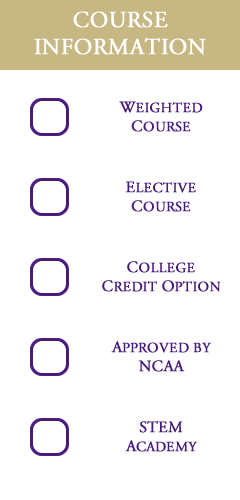 |
| College Prep |
2 Semesters |
1.0 Credit |
| Prerequisites: Open to Freshmen; Department approval |
|
| Course Description: This course is designed to supplement and develop the skills of students who have struggled with mathematics. By examining incoming freshman placement test results, standardized test scores, and middle school mathematics grades, students who would benefit from additional mathematics support are identified and enrolled in this class concurrently with Algebra 1. This intensive support affords students the opportunity to practice mathematics every day, and this additional practice helps students increase their mathematical skills and confidence to be successful in completing Algebra 1 their freshman year. |
|
 |
|
|
| |
|
 |
| College Prep |
2 Semesters |
1.0 Credit |
| Prerequisites: Open to Freshmen |
|
| Course Description: This course is designed to develop the students’ algebraic skills through practice, application, and problem-solving. This course provides the foundation for future mathematics courses and is required for graduation. The curriculum follows the Common Core State Standards and includes the following primary topics: foundations for algebra, solving equations and inequalities, introduction to functions, linear functions and equations, graphing, systems of equations and inequalities, exponential functions, factoring and quadratic functions. Upon completion of the placement test, incoming freshmen may be placed directly into Honors Geometry. This exempts the student from needing Algebra 1 for graduation. However, three credits of mathematics are still required. |
|
 |
|
|
| |
|
 |
| Honors / A.P. |
2 Semesters |
1.0 Credit |
| Prerequisites: Open to Freshmen; Department approval |
|
| Course Description: This honors-level course is designed to challenge students while developing the students’ algebraic skills through practice, application, and problem-solving. This fast-paced course provides the foundation for future mathematics courses. The curriculum follows the Common Core State Standards and includes the following primary topics: foundations for algebra, solving equations and inequalities, introduction to functions, linear functions and equations, graphing, systems of equations and inequalities, exponential functions, factoring, quadratic and polynomial functions. |
|
 |
|
|
| |
|
 |
| College Prep |
2 Semesters |
1.0 Credit |
| Prerequisites: Open to Sophomores; Integrated Mathematics 1 |
|
Course Description: This course is designed to develop students' critical thinking skills through practice, practical application, and authentic problem-solving. It builds on the foundation established in Integrated Mathematics 1 for future mathematics courses and is required for graduation. The course includes the topics of non-linear functions and higher-order polynomials, relationships and equations of geometric shapes, and the exploration of probability. Students will graph polynomials and adapt them to applications. Additionally, the course includes geometric concepts, triangle relations, including similarity, and the geometry and algebra of circles.
Upon completion of the placement test, incoming freshmen may be placed directly into Honors Integrated Mathematics 2. This exempts the student from needing Integrated Mathematics 1 for graduation. However, three credits of mathematics are still required. |
|
 |
|
|
| |
| HONORS INTEGRATED MATHEMATICS 2 |
|
 |
| College Prep |
2 Semesters |
1.0 Credit |
| Prerequisites: Open to Freshmen and Sophomores; Department approval; Integrated Mathematics 1 |
|
Course Description: This honors-level course is designed to challenge students while developing their critical thinking skills through practice, practical application, and authentic problem-solving. This fast-paced course builds on the foundation established in Honors Integrated Mathematics 1 for future mathematics courses and is required for graduation. The course includes the topics of non-linear functions and higher-order polynomials, relationships and equations of geometric shapes, and the exploration of probability. Students will graph polynomials and adapt them to applications. Additionally, the course includes geometric concepts, triangle relations, including similarity, and the geometry and algebra of circles.
Upon completion of the placement test, incoming freshmen may be placed directly into Honors Integrated Mathematics 2. This exempts the student from needing Integrated Mathematics 1 for graduation. However, three credits of mathematics are still required. |
|
 |
|
|
| |
|
 |
| College Prep |
2 Semester |
1.0 Credit |
| Prerequisites: Open to Sophomores; Algebra 1 |
|
| Course Description: This course is designed to develop logical thinking through deductive reasoning and to study properties of geometric figures. This course is required for graduation and follows the NCTM Mathematics Principles and Standards. Topics covered include the language and foundational ideas of geometry, properties of parallel and perpendicular lines, properties and relationships within triangles, triangle congruency and similarity, right triangle trigonometry, properties of quadrilaterals and other types of polygons, properties of circles, perimeters, circumference, and area of two-dimensional figures, and surface area and volume of three-dimensional figures. Students will also learn to apply geometric ideas to the real world. |
|
 |
|
|
| |
|
 |
| Honors / A.P. |
2 Semesters |
1.0 Credit |
| Prerequisites: Open to Freshmen and Sophomores; Department approval; Algebra 1 |
|
| Course Description: This honors-level course is designed to challenge students by developing logical thinking through both deductive and inductive reasoning by studying the same topics included in the Geometry course, with a heavy emphasis on formal proofs. Topics to be covered include all of the topics from the Geometry course, plus formal logic and proofs, geometric transformations, and isometries. |
|
 |
|
|
| |
|
 |
| College Prep |
2 Semesters |
1.0 Credit |
| Prerequisites: Open to Juniors |
|
| Course Description: This course provides a second-year course in Algebra with emphasis on practice and application. The goals of this course are to help students develop mathematical maturity and prepare them for upper-level mathematical classes. This course follows the NCTM Standards and expands on topics covered in Algebra 1, including polynomials, systems of equations and inequalities, rational numbers, relations, functions, linear and quadratic graphs, graphs of higher-order polynomial functions, rational expressions, and complex numbers. |
|
 |
|
|
| |
|
 |
| College Prep |
2 Semesters |
1.0 Credit |
| Prerequisites: Open to Juniors; Department approval; Teacher approval |
|
| Course Description: This course provides a second-year course in Algebra with emphasis on theory, practice, application, and problem-solving. Students are placed in this accelerated class based on the recommendation of their Freshman and Sophomore mathematics teachers. The goals of this course are to help students develop mathematical maturity and prepare them for upper-level mathematics classes. This course follows the NCTM Standards and expands on topics covered in Algebra 1, including polynomials, systems of equations and inequalities, rational numbers, relations, functions, linear and quadratic graphs, graphs of higher-order polynomial functions, rational expressions, exponential functions and complex numbers. The content also includes a study of trigonometry. |
|
 |
|
|
| |
| HONORS ALGEBRA 2 / TRIGONOMETRY |
|
 |
| Honors / A.P. |
2 Semesters |
1.0 Credit |
| Prerequisites: Open to Freshmen, Sophomores, and Juniors; Department approval; Teacher approval; Honors Geometry or concurrent enrollment |
|
Course Description: This honors-level course provides a second-year study of Algebra with emphasis on theory, practice, application, and problem-solving. The goals of this course are to help students develop mathematical maturity and prepare them for Math Analysis and Calculus. This course follows the NCTM Standards and expands on topics covered in Algebra 1, including polynomials, systems of equations and inequalities, rational numbers, relations, functions, linear and quadratic graphs, graphs of higher-order polynomial functions, rational expressions. Additionally, exponential/logarithmic functions and complex numbers are covered. The content also includes an in-depth study of trigonometry.
|
|
 |
|
|
| |
|
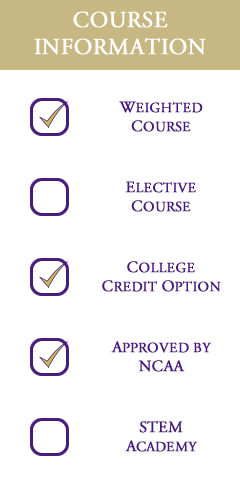 |
| Honors / A.P. |
2 Semesters |
1.0 Credit |
| Prerequisites: Open to Sophomores, Juniors, and Seniors; Department approval; Teacher approval; Algebra 2 / Trigonometry or College Algebra |
|
Course Description: This honors-level course is designed primarily for Juniors and Seniors who have successfully completed Algebra 2 / Trigonometry and have been recommended by their Algebra 2 / Trigonometry teacher. The content of this course provides a thorough preparation for more advanced college mathematics, with emphasis on graphing and data and function analysis. Topics covered include polynomial and rational functions, trigonometric functions and applications, exponential and logarithmic functions, polar coordinates and vectors, analytic geometry, systems of equations and inequalities, matrices, sequences and series, and an introduction to limits.
Students are eligible for college credit through the University of Missouri-St. Louis. |
|
 |
|
|
| |
|
 |
| Honors / A.P. |
2 Semesters |
1.0 Credit |
| Prerequisites: Open to Juniors and Seniors; Department approval; Algebra 2 / Trigonometry |
|
Course Description: The main focus of this honors-level course will be on understanding statistical concepts, language, and techniques. Students are expected to effectively use experimental design, data analysis, and inference to reach well-reasoned and appropriately communicated conclusions and decisions in a real-world context. This course involves the study of four main areas: exploratory analysis, planning and conducting a study, probability, and statistical inference.
The focus of this course will be on preparing students for the A.P. Exam. Students are eligible for college credit through the University of Missouri-St. Louis. |
|
 |
|
|
| |
|
 |
| Honors / A.P. |
2 Semesters |
1.0 Credit |
| Prerequisites: Open to Juniors and Seniors; Department approval; Pre-Calculus |
|
Course Description: The main emphasis of this honors-level course will be on understanding the definitions and principles of Calculus. Concepts will be explored graphically, numerically, analytically, and verbally. Functions and graphs will be utilized to examine the concepts of limits and continuity. Applications of the derivative, definite and indefinite integrals, differential equations, techniques of integration, and transcendental functions are investigated. Using this knowledge, real-world applications will be applied and solved. Students will interpret their results and support their conclusions.
The focus of this course will be on preparing students for the A.P. Exam. Students are eligible for college credit through the University of Missouri-St. Louis. |
|
 |
|
|
| |
|
 |
| Honors / A.P. |
2 Semesters |
1.0 Credit |
| Prerequisites: Open to Seniors; Department approval; Teacher approval; A.P. Calculus AB |
|
Course Description: The main focus of this honors-level course will be furthering understanding of the definitions and principles of Calculus. It develops techniques of integration, applications of integration, infinite sequences and series, convergence tests, power series, parametric curves, polar coordinates, and conic sections. The mastery of calculus requires well-developed skills, clear conceptual understanding, and the ability to model phenomena in a variety of settings.
The focus of this course will be on preparing students for the A.P. Exam. Students are eligible for college credit through the University of Missouri-St. Louis or through the University of Missouri Online Independent Study Program. |
|
 |
|
|
| |
|
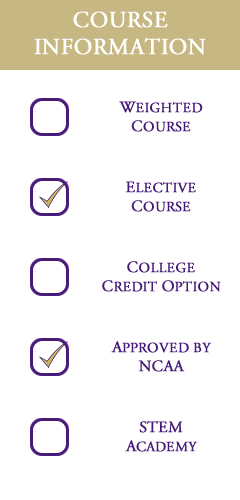 |
| College Prep |
1 Semester |
.5 Credit |
| Prerequisites: Open to Seniors; Algebra 2 |
|
| Course Description: This course is structured as an intermediate algebra course and includes topics that are an extension of the Algebra 2 curriculum. The course will be set up as a project-based learning (PBL) environment, with the students in the class identifying one or more authentic real world problems to solve using math. The class will ultimately formulate a solution to the identified problem(s) as a collaborative group. |
|
 |
|
|
| |
| COLLEGE ALGEBRA / TRIGONOMETRY |
|
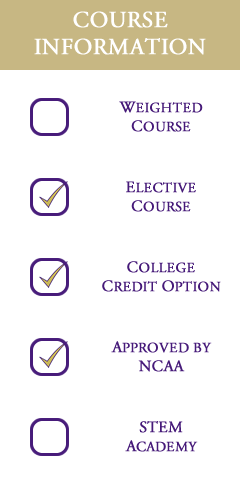 |
| College Prep |
2 Semesters |
1.0 Credit |
| Prerequisites: Open to Seniors; Algebra 2; Teacher approval |
|
Course Description: This course provides a thorough foundation for future college math courses. Topics include an in-depth exploration of algebra, probability, polynomial functions, the binomial theorem, logarithms, exponentials, and systems of equations and inequalities.
Students are eligible for college credit through the University of Missouri-St. Louis. |
|
 |
|
|
| |
|
 |
| College Prep |
1 Semester |
.5 Credit |
| Prerequisites: Open to Seniors; Algebra 2; Teacher approval |
|
Course Description: This course will cover the following topics: consumer mathematics, ratio and proportion, probability and statistics, sets, and logic. Furthermore, this course will help students see how mathematics is applied to daily life while developing critical thinking and quantitative reasoning skills. |
|
 |
|
|
| |
|
 |
| College Prep |
1 Semester |
.5 Credit |
| Prerequisites: Open to Seniors; Department approval; Algebra 2/Trigonometry |
|
| Course Description: This course is designed for students who are interested in the study of applied sciences and engineering, but who are not quite ready for a full year of A.P. Calculus. Topics of the course include a review of advanced algebraic and trigonometric functions from analytical, graphical, and numerical perspectives. Limits and an introduction to derivatives will also be covered. |
|
 |
|
|
| |
| INTRODUCTION TO STATISTICS |
|
 |
| College Prep |
1 Semester |
.5 Credit |
| Prerequisites: Open to Juniors and Seniors; Teacher approval; Algebra 2 or concurrent enrollment |
|
Course Description: This course is an introduction to statistics for those students looking for an introduction to the field of probability and statistics, but who are not ready for a full year of A.P. Statistics. This course will explore probability, standard deviation, data collection, data analysis, and applications of statistics. The focus of this class is the utilization of statistical data to examine real world situations, which should allow the students to see mathematics from a practical standpoint as usable and meaningful. Exploration of word problems and other aspects of algebra will also be a point of emphasis.
If this course is taken in conjunction with Introduction to Statistics 2 during a single school year, students are eligible for college credit through the University of Missouri-St. Louis.
|
|
 |
|
|
| |
| INTRODUCTION TO STATISTICS 2 |
|
 |
| College Prep |
1 Semester |
.5 Credit |
| Prerequisites: Open to Juniors and Seniors; Teacher approval; Algebra 2 or concurrent enrollment and Introduction to Statistics |
|
Course Description: This course is a continuation of the Introduction to Statistics course. Students taking this course will continue their study of statistics by working with probability distributions, normal probability distributions, hypothesis testing with one and two samples, and correlation and regression. Students will continue analyzing collected data and solve real world problems using statistics.
If this course is taken in conjunction with Introduction to Statistics 1 during a single school year, students are eligible for college credit through the University of Missouri-St. Louis.
|
|
 |
|
|
| |
|
 |
| College Prep |
1 Semester |
.5 Credit |
| Prerequisites: Open to Seniors; Algebra 2 |
|
| Course Description: This course is designed for seniors who have the desire to continue towards the study in applied sciences, engineering or other areas of study needing emphasis on mathematics. This course covers the following topics: relations and functions, circular functions, trigonometric functions, trigonometric equations, identities, and polar equations. |
|
 |
|
|
| |
|
|

























